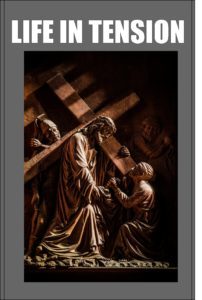Spiritual Links and Tensions

Do not think that I have come to abolish the Law or the Prophets;
I have not come to abolish them but to fulfill them. (Matt 5:17)
By Stephen W. Hiemstra
The subjective tensions in our spiritual life track the objective gaps in our inward, upward, and outward relationships, and are deeply rooted in the witness of the Old Testament. In the inward gap, which arises between who we were and the person that God created us to be, we find in allusions to the person of Moses. In the upward gap, which arises between us and God, we find in allusions to the character of God Himself. In the outward gap, which arises between us and those around us, we find allusions to the messianic prophecies of Isaiah. Together, these gaps and tensions suggest how Jesus intended Old Testament prophecy to be fulfilled.
Focusing on the inward gap, the first three Beatitudes:
Honored are the poor in spirit, for theirs is the kingdom of heaven. Honored are those who mourn, for they shall be comforted. Honored are the meek, for they shall inherit the earth. (Matt 5:3–5)
These Beatitudes focus on who we are and borrow their language, in part, from Isaiah 61:1. However, the influence goes further back to the attitude and person of Moses, as in: “Now the man Moses was very meek, more than all people who were on the face of the earth.” (Num 12:3). The dominant motif in these three Beatitudes—meekness or humility—is expressed by Moses whose overall spirituality is well-defined in the Books of the Law.
Focusing on the upward gap, the second three Beatitudes:
Honored are those who hunger and thirst for righteousness, for they shall be satisfied. Honored are the merciful, for they shall receive mercy. Honored are the pure in heart, for they shall see God. (Matt 5:6–8)
These Beatitudes focus on God and God’s core values expressed in Exodus 34:6:
The LORD passed before him and proclaimed, The LORD, the LORD, a God merciful and gracious, slow to anger, and abounding in steadfast love and faithfulness (Exod 34:6).
The repeated references to God’s character in the Old Testament, especially Jonah 4:2, highlight God’s mercy and Christ’s atoning work on the cross (1 Cor 15:3).
Focusing on the outward gap, the last three Beatitudes:
Honored are the peacemakers, for they shall be called sons of God. Honored are those who are persecuted for righteousness’ sake, for theirs is the kingdom of heaven. Honored are you when others revile you and persecute you and utter all kinds of evil against you falsely on my account. (Matt 5:9–11)
These Beatitudes focus on what we do and draw us back to Isaiah 61:1:
The Spirit of the Lord GOD is upon me, because the LORD has anointed me to bring good news to the poor; he has sent me to bind up the brokenhearted, to proclaim liberty to the captives, and the opening of the prison to those who are bound; (Isa 61:1)
God’s sovereign work instituting shalom in a social context is unexpected—we do not expect to experience God’s presence in the context of persecution. Yet, even during persecution God is not only present, he is sovereignly at work to transform lives and to offer shalom, the heart of Christian spirituality.
The Beatitudes are a key to Jesus’ own spirituality. A complete spirituality needs to answer four important questions (Kreeft 2007, 6) The questions are: Who is God? (metaphysics); Who are we? (anthropology); How do we know? (epistemology); and What do we do about it? (ethics) The Beatitudes answer three of these four questions: Who is God? (God is merciful . . .); Who are we? (we are meek like Moses); and What do we do about it? (we offer shalom). Jesus’ resurrection answers the fourth question: How do we know? (because Christ rose from the dead).
Knowing that the Beatitudes are anchored in the Old Testament, not only highlights God’s immutable character traits in Exodus 34:6, it ties Christ’s divinity to them. The Beatitudes and their scriptural context assure that we do not shape Jesus into a likeness of our own image. This is why the early church focused intensely on the Beatitudes (Guelich 1982, 14) and why the Beatitudes deserve renewed study today.
References
Guelich, Robert. 1982. The Sermon on the Mount: A Foundation for Understanding. Dallas: Word Publishing.
Kreeft, Peter. 2007. The Philosophy of Jesus. South Bend, IN: Saint Augustine Press.
Spiritual Links and Tensions
Also see:
Preface to a Life in Tension
Other ways to engage online:
Author site: http://www.StephenWHiemstra.net
Publisher site: http://www.T2Pneuma.com
Newsletter: https://bit.ly/Plow_2020
The post Spiritual Links and Tensions appeared first on T2Pneuma.net.



